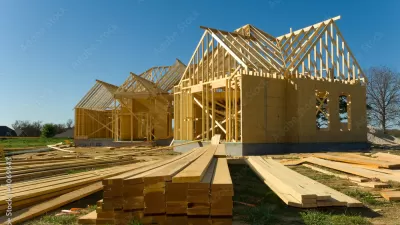Emily Badger pulls particularly salient information from last week's Pew Research Center's report on political attitudes: liberals prefer the city while conservatives prefer small towns and rural areas.
According to analysis by Emily Badger of a new study by the Pew Research Center that found evidence of widening political polarization in the United States, the study also found evidence that Americans tend to make lifestyle choices, especially about where to live, along political lines. "Seventy-seven percent of 'consistently liberal' adults went with what sounded like dthe [sic] urban milieu: the dense neighborhood, the compact home, the 'walkability.' Fully seventy-five percent of 'consistently conservative' adults went with the polar opposite," writes Badger.
Unclear, however, is that the data means about why people make these choices. "This latest Pew data, though, renews some curious questions about what's really going on here," says Badger. Some examples of the questions raised by the findings:
"Does ideology inform our living choices, or is it the other way around? Do liberals move to cities because cities happen to have the things that liberals like: dense amenities, cultural institutions, greater diversity?"
"Or do people who happen to live in cities because they value those things come to lean liberal thanks to other concerns inherent in that way of living?"
"Likewise, do conservatives settle in the exurbs and beyond because they want room to stretch out and a fenced-in yard? Or does having those things make you value privacy and individualism -- and the ideology that defends them?"
FULL STORY: Conservatives are from McMansions, liberals are from the city

Study: Maui’s Plan to Convert Vacation Rentals to Long-Term Housing Could Cause Nearly $1 Billion Economic Loss
The plan would reduce visitor accommodation by 25,% resulting in 1,900 jobs lost.

North Texas Transit Leaders Tout Benefits of TOD for Growing Region
At a summit focused on transit-oriented development, policymakers discussed how North Texas’ expanded light rail system can serve as a tool for economic growth.

Why Should We Subsidize Public Transportation?
Many public transit agencies face financial stress due to rising costs, declining fare revenue, and declining subsidies. Transit advocates must provide a strong business case for increasing public transit funding.

How to Make US Trains Faster
Changes to boarding platforms and a switch to electric trains could improve U.S. passenger rail service without the added cost of high-speed rail.

Columbia’s Revitalized ‘Loop’ Is a Hub for Local Entrepreneurs
A focus on small businesses is helping a commercial corridor in Columbia, Missouri thrive.

Invasive Insect Threatens Minnesota’s Ash Forests
The Emerald Ash Borer is a rapidly spreading invasive pest threatening Minnesota’s ash trees, and homeowners are encouraged to plant diverse replacement species, avoid moving ash firewood, and monitor for signs of infestation.
Urban Design for Planners 1: Software Tools
This six-course series explores essential urban design concepts using open source software and equips planners with the tools they need to participate fully in the urban design process.
Planning for Universal Design
Learn the tools for implementing Universal Design in planning regulations.
City of Santa Clarita
Ascent Environmental
Institute for Housing and Urban Development Studies (IHS)
City of Grandview
Harvard GSD Executive Education
Toledo-Lucas County Plan Commissions
Salt Lake City
NYU Wagner Graduate School of Public Service




























